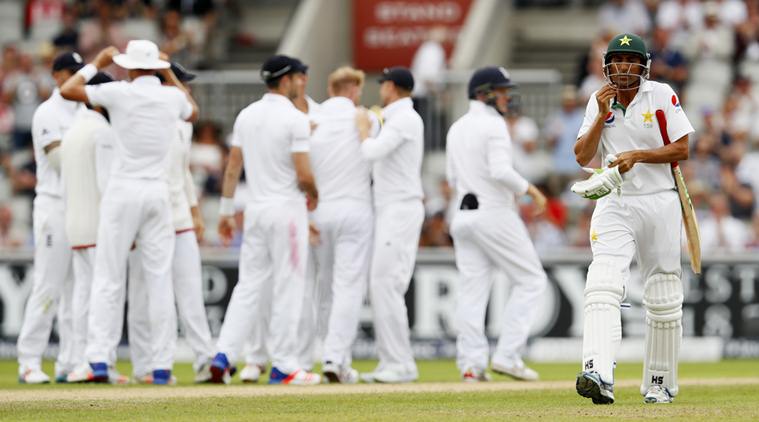England managed to redeem themselves and draw the (absurdly short) Test series against Pakistan with an emphatic innings victory in the second Test at Headingley.
The match followed a curiously similar path to that of the first Test at Lord’s. This time it was Sarfraz Ahmed’s turn to win a toss he might have preferred to lose – because of overhead conditions rather than the pitch – and see his batsmen give a feckless display against tight seam and swing bowling. 174 was always below par, and England’s batsmen responded solidly if not spectacularly with 363. This time the match did not get beyond the third evening as the visitors were hassled out for 134.
A Test match – indeed any match at least up to a point – is a complex mechanism. Because of the time involved and the opportunity for larger and smaller shifts of fortune, a lot of things have to go right for a team to beat an opponent with comparable ability. Winning the occasional session, as England frequently demonstrate, simply isn’t enough. Bowlers, especially spinners, have to be patient and develop “plans” to trap batsmen. Batsmen too have to build an innings and bat for hours at a time.
At the same time, however, each ball delivered by a bowler is a unique and unpredictable event. This is part of what gives cricket its endless fascination. There is not really a comparable “event” to the delivery of a ball in cricket in any other sport unless one thinks about the very last “shot” – to use a neutral term – in a contest, such as Doug Sanders’ final putt in the last round of the Open at St Andrews in 1970 which he needed to sink to win the tournament. He missed the three-foot putt and then lost the play-off to Jack Nicklaus. Nobody who heard it will ever forget Henry Longhurst’s television commentary build-up to that final putt.
But I digress. The real point about an individual ball delivered in a cricket match is that it can result in the dismissal of a batsman and his or her removal from the complex equation of the match. The result is that it is sometimes possible to say that a single delivery had a vital, perhaps determining effect on the outcome of the contest. Headingley provided an example of this.
On the second afternoon England’s night-watchman Dom Bess was out to leg-spinner Shadab Khan and England were 212-for-five. This brought in the last recognised batsman, Jos Buttler, to join Jonny Bairstow.
In Shadab’s next over, with Buttler already on eight, he clipped a ball hard to midwicket where Hasan Ali dropped a difficult but far from impossible. chance.
Had that chance been taken, England would have been 224-for-six with just Bairstow and the tail to bat. The lead was only fifty; Pakistan would have been very much still in the game.
But that wasn’t the situation; Buttler was still there. Even at the time some commentators said that Buttler was not the sort of player to whom you wanted to give a second chance. He ended up with eighty not out, the highest score of the series, and, more importantly he took the game away from Pakistan, making an England win more or less inevitable.
Anyone can drop a catch. Like everything else in life some are more difficult than others. And, of course, they don’t always have the sort of consequences that dropping Buttler did for Pakistan. The 2017 English season saw two contrasting examples. The first was in the Champions Trophy group match between Pakistan and Sri Lanka at Cardiff, effectively a quarter final. Pakistan were seven wickets down with sixty or so still to get when Sarfraz was fooled by a slower ball from Lasith Malinga which he hit straight to Kusal Perera, who dropped it. Sarfraz guided his team to victory and they went on to win the tournament. Then, in the game of the season, the Women’s World Cup final at Lord’s between England and India, an Indian collapse appeared to be halted when Jenny Gunn, at mid-off dropped an absolute sitter to reprieve Poonam Yadav. But the unstoppable Anya Shrubsole took a wicket with her next ball and England won by nine runs.
The classic example of a game whose outcome was determined by a dropped catch was the Super Six game between Australia and South Africa at Headingley in the 1999 World Cup. This was a game Australia had to win to avoid elimination from the tournament: South Africa had already qualified for a semi-final place.
South Africa batted first and scored 271-for-seven, opener Herschelle Gibbs making a century. Australia were struggling on 48-for-three when captain Steve Waugh came in to join Ricky Ponting, and they steadied the ship. The critical moment was described by Waugh in his 801-page autobiography. When he was on 56 “a miraculous event occurred”. Gibbs, one of the best fielders in the world, dropped a simple catch while in the act of celebrating catching it by throwing it up in the air. When their paths crossed mid-pitch Waugh could not resist saying “Do you realise you’ve just cost your team the match?” He was right; Waugh made 120 not out, Australia went on to win the match, to beat South Africa again in an amazing semi-final and beat Pakistan in the final.
The greatest Test series of modern times, the Ashes series of 2005, came to a rousing finale on the fifth day at The Oval, which England effectively had to bat through in order to maintain their two-one lead. It became clear at an early stage that if this was going to happen everything would depend on their least experienced Test batsman, Kevin Pietersen. In the end Pietersen made 158 not out, one of the greatest Test innings of the twenty-first century, to secure the draw. But when he was only fifteen he edged a short, fast ball from Brett Lee to Shane Warne at slip, who dropped it.
Wicket keepers are in a special category. One can’t help feeling that, unlike most things, the standard of keeping in international cricket must have declined, now that they are expected to make runs. The first “modern” keeper was Jim Parks of Sussex. He was one of the most attractive and aggressive batsmen of his day (immortalised in a fine poem by John Arlott, “J.M. Parks at Tunbridge Wells”) and he was a fine outfielder when younger but turned himself into a wicketkeeper good enough to play in 46 Tests for England (the first, in 1954, as a batsman).
Everyone knew that Parks was not the best keeper in England. In the second Test against Australia in 1965-66 England gained a first innings lead of two hundred and Australia were three down in their second innings when he missed a chance to stump Peter Burge off Bob Barber. Burge went on to make a century and Australia saved the game. The curmudgeonly E M Wellings, summarising the tour in Wisden, had no doubt about the significance of Parks’ miss; “His blunder in missing a simple off-side chance of stumping Burge off Barber in the second innings almost certainly cost England the second Test and with it the Ashes.” Ouch.
A dropped catch can be a career-changing event, though not usually for the fielder. The third Ashes Test of 1997, at Headingley, was a crucial game. Amazingly, England were still in the series. They had actually won the first Test. The second, at Lord’s, was a rain-affected draw, and Australia won the third. For the fourth the England selectors caused a surprise by picking the Gloucestershire left arm swing bowler Mike Smith. England made 172 in their first innings. At first Australia struggled against Darren Gough and Dean Headley and were fifty-for-four at one point. This was when Smith was brought on. He immediately induced opener Matthew Elliott to edge one to Graham Thorpe at first slip. Thorpe dropped it. Elliott made 199. Australia made 501-for-nine and won by an innings. Smith took nought-for-89 and never played again.
Some fielders are, perhaps unfairly, remembered for dropping catches. I have a vivid recollection of watching Monty Panesar twice dropping Mahela Jayawardene in a Test at Galle – both were high steepling chances. One was simpler than the other though there was a sort of ghastly slow-motion inevitability about both of the drops. One of Panesar’s predecessors as slow left arm bowler for England, Phil Tufnell, is sometimes associated with inept fielding too. Ironically, the man who came between them, Ashley Giles, a far more competent fielder as well as batsman, dropped the biggest clanger of all, missing Ponting at Adelaide in 2006-07. England were in a seemingly impregnable position when they declared their first inning on 551-for-six. When Ponting was on thirty-five, early on the third morning, he pulled a ball from Matthew Hoggard straight to Giles at deep mid-wicket, but he could not hold on. Ponting made a century and Australia, thanks largely to Warne, secured a genuinely sensational win.
One of the most curious selections by MCC in an Ashes series was that of the Reverend D S Sheppard in 1962-63. Sheppard had been a significant, if peripheral, figure in English cricket for over a decade. He was one of a number of outstanding batsmen (that included Peter May) for Cambridge University and toured Australia, without success, in 1950-51. Clerical duties kept him away from regular cricket for much of the 1950s though he usually managed a fair number of games for Sussex and never seemed far from selection for England when available. (Much later he was to attain national prominence, particularly during the years of the Thatcher government, as Bishop of Liverpool.) He made a dramatic return to the Test side for the fourth Test against Australia at Old Trafford in 1956 (Jim Laker’s match) making a century in England’s only innings.
In 1962, the last year in which there was a distinction between amateur and professional cricketers, he played in two of the Test against Pakistan and then took a sabbatical and made himself available for the tour of Australia and New Zealand.
Sheppard did well as a batsman, making a hundred and two-fifties. When younger he had been a fine close fielder. Not surprisingly perhaps this part of his game had declined. Indeed, most judges thought the main issue dividing the teams, the series was drawn one-all, was the fielding.
Sheppard dropped a number of catches in the slips. Inevitably, more often than not the victim was the voluble and irascible fast bowler Fred Trueman. The story goes that on one occasion after another let-off, the great Yorkshireman finished his follow through and glared at Sheppard from mid-pitch.
“For Heaven’s sake,” (or words to that effect) “pretend it’s Sunday Reverend, and keep your hands together.”
Bill Ricquier




